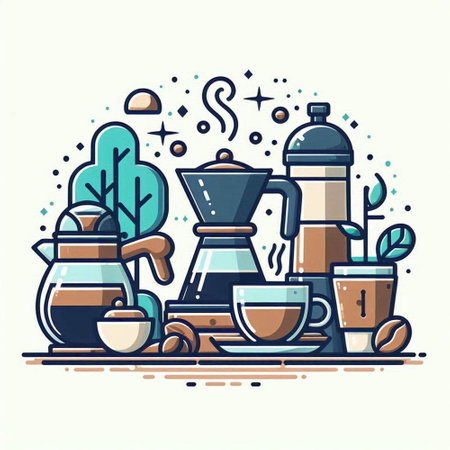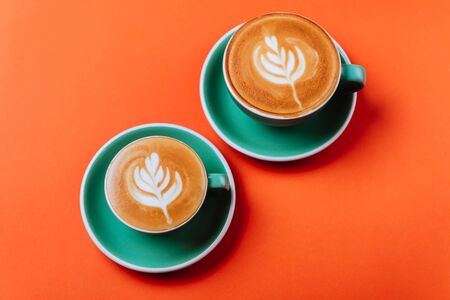Introduction: The Social Essence of Coffee in Indias Festive Culture
Coffee, once a niche beverage found mainly in the southern states of India, has steadily brewed its way into the collective consciousness of the nation. Today, it stands not just as a drink, but as a symbol of warmth, hospitality, and togetherness—especially during the myriad of vibrant festivals that dot the Indian calendar. From the lantern-lit evenings of Diwali to the kaleidoscopic revelry of Holi and the spiritual gatherings during Eid, coffee has found a unique place at the heart of these celebrations. The act of serving coffee is more than a simple refreshment; it reflects evolving tastes, urban influences, and the beautiful interplay between traditional customs and contemporary lifestyles. Exploring how coffee has woven itself into the rich tapestry of Indian celebrations reveals much about the countrys ever-changing social landscape and its embrace of diversity. As India continues to celebrate its festivals with renewed zeal each year, coffee emerges as both a unifying thread and a marker of cultural transformation across communities.
Coffee at Eid: Aromatic Hospitality and Sacred Togetherness
During the sacred festival of Eid, Indian Muslim households across regions—from Hyderabad to Lucknow—embrace a tradition where hospitality is expressed through carefully prepared beverages. While meethi chai (sweet tea) has long been associated with Eid gatherings, the growing popularity of kaapi (South Indian filter coffee) and other forms of coffee reflects a dynamic blend of heritage and modernity. Serving coffee during Eid is not merely about offering a drink; it is an act rooted in warmth, brotherhood, and the spirit of coming together after the holy month of Ramadan.
In many families, the first cup of the day—whether chai or coffee—is shared with close kin before the grand Eid namaz (prayer). Coffee’s aromatic notes often mingle with the fragrances of cardamom and rosewater that infuse festive sweets like sheer khurma or phirni. This simple ritual becomes a symbol of inclusion, as relatives, neighbours, and friends are welcomed into one’s home with a steaming tumbler or dainty porcelain cup.
Understanding the nuances between meethi chai and kaapi reveals cultural distinctions shaped by geography, faith, and generational preferences. While North Indian Muslims traditionally favour sweetened milk tea infused with spices, South Indian Muslim homes might brew strong filter coffee—sometimes enriched with jaggery or spiced with a hint of ginger. The table below highlights these regional variations:
| Beverage | Region | Main Ingredients | Serving Style |
|---|---|---|---|
| Meethi Chai | North India (Delhi, Lucknow) | Milk, sugar, black tea leaves, cardamom | Kulhar (clay cup) or glass |
| Kaapi (Filter Coffee) | South India (Hyderabad, Chennai) | Freshly ground coffee, chicory, milk, sugar/jaggery | Steel tumbler and davara set |
| Aromatic Black Coffee | Keralas Malabar region | Robusta beans, spices (ginger/cardamom), no milk | Ceramic cup or brass mug |
This practice of serving coffee fosters a sense of sacred togetherness—guests exchange heartfelt “Eid Mubarak” wishes over sips that warm both body and soul. The aroma drifting from kitchens signals not just festivity but also unity: a reminder that in every Indian Muslim home, sharing a cup during Eid is an invitation to celebrate faith, food, and family ties.

3. Diwali Delights: Coffee Amidst Sweets and Diyas
Diwali, the Festival of Lights, is a time when Indian homes sparkle with diyas, laughter, and the sweet aroma of festive treats. Yet, nestled amid laddoos and barfis, coffee has quietly woven itself into the fabric of Diwali celebrations. In South Indian households, serving a cup of hot filter kaapi after the Lakshmi Puja is as essential as lighting the first diya. The ritual of brewing strong decoction and mixing it with frothy milk becomes an act of love—shared among family members and neighbours who drop by with plates of sweets and smiles.
Across urban India, the coffee experience during Diwali has evolved. Modern café blends and artisanal brews now join traditional kaapi on the table, reflecting both nostalgia and cosmopolitan flair. Whether it’s spiced cappuccinos or cold brews infused with cardamom, coffee bridges generations at Diwali gatherings. Its presence symbolises unity—an inclusive gesture that welcomes guests from different walks of life to sit together in celebration. Sharing coffee during Diwali isn’t just about refreshment; it signifies abundance, hospitality, and the warmth of togetherness as families gather under twinkling lights to exchange stories, gifts, and blessings.
4. Holi Gatherings: Coffee, Colours, and Community
Holi, the exuberant festival of colours celebrated across India, is synonymous with playful splashes of gulal, lively music, and a joyous spirit of togetherness. Traditionally, Holi gatherings revolve around iconic beverages like thandai—a cooling milk-based drink infused with spices, nuts, and sometimes bhang—and a vibrant array of mithai such as gujiya and malpua. In recent years, however, coffee has begun to carve out its own space at these festivities, blending seamlessly with local customs while adding a contemporary flair.
Coffee’s growing presence at Holi is particularly evident in urban households and among younger generations who seek both comfort and energy during the day-long celebrations. Whether served as piping hot filter coffee in South Indian homes or as trendy cold brews in metropolitan settings, it provides a familiar yet invigorating pause amidst the revelry. The rich aroma of freshly brewed coffee now mingles with the scents of marigold and sandalwood that permeate Holi gatherings.
The Interplay: Coffee, Thandai & Mithai
While thandai remains the quintessential Holi drink for many families, coffee is finding its way onto the festive menu alongside traditional sweets. The following table highlights how these beverages complement one another:
| Beverage | Occasion/Timing | Pairing with Mithai | Cultural Note |
|---|---|---|---|
| Thandai | Noon to Afternoon | Gujiya, Malpua | Traditional; cooling effect after outdoor play |
| Coffee (Hot/Cold) | Morning & Evening Gatherings | Kaju Katli, Besan Ladoo | Modern touch; energizes guests for extended celebrations |
Coffee’s Role in Energizing Social Interactions
As friends and family gather—faces streaked with colour—to share stories and laughter, coffee becomes more than just a beverage. It is a catalyst for vibrant conversations and a symbol of hospitality. Hosts often serve coffee to rejuvenate guests after hours of colour play under the sun or during evening reunions when the tempo shifts to relaxed chatter and melodies.
A Blend of Tradition and Modernity
The integration of coffee into Holi traditions reflects India’s evolving cultural tapestry—where age-old rituals harmonize with contemporary tastes. Whether enjoyed from steel tumblers on verandahs in Lucknow or sipped from ceramic mugs on Delhi rooftops, coffee adds warmth and energy to Holi’s communal spirit, ensuring that every gathering is both rooted in heritage and open to new expressions.
5. Unique Regional Traditions: Filter Kaapi, Instant Coffee, and Local Variations
India’s relationship with coffee is as diverse as its festivals and languages. During major celebrations like Eid, Diwali, and Holi, each region brings its own special flair to how coffee is brewed, served, and enjoyed.
South India: The Ritual of Filter Kaapi
No discussion of Indian coffee culture is complete without mentioning the legendary Filter Kaapi of Tamil Nadu and Karnataka. During Diwali or Pongal gatherings in Chennai or Bengaluru, families serve strong decoction-based filter coffee in stainless steel tumblers and dabarahs. The process itself—boiling fresh milk, mixing it with dark roasted beans ground with chicory, and pouring it back and forth for froth—is a festive ritual. Sharing filter kaapi is a symbol of hospitality and warmth, especially when extended to guests after lighting diyas on Diwali night.
North India: Instant Coffee Innovations
In Delhi, Lucknow, and northern cities, instant coffee has become synonymous with quick hospitality during busy festival days. Particularly during Holi parties or Eid get-togethers where large groups gather, “phenti hui coffee”—frothy whipped instant coffee—is made by beating instant powder with sugar and a little water before adding hot milk. The result is a creamy cup that’s both nostalgic and practical. This style is often accompanied by sweets like gujiya or seviyan, reflecting the fusion of local snacks with modern beverage choices.
Western & Eastern India: Local Flavours Take Centre Stage
Mumbai’s cosmopolitan spirit shines through in its festival coffees; it’s common to find spiced versions infused with cardamom or nutmeg during Diwali visits. In Kolkata, particularly among the city’s Anglo-Indian communities during Christmas or Eid-ul-Fitr, chicory-laden blends and sweetened brews are popular at home parties. Some households even add jaggery or condensed milk for an extra touch of celebration.
Festivals as a Canvas for Creativity
The beauty of serving coffee during Indian festivals lies in this incredible regional diversity—from the robust filter kaapi at a South Indian Deepavali breakfast to the creamy instant concoctions at a North Indian Holi bash. Each cup tells a story—not just of family traditions but also of adaptation, innovation, and shared joy across the subcontinent’s many cultures.
6. Changing Trends: Coffee Culture in Contemporary Indian Festivities
The landscape of serving coffee at major Indian festivals like Eid, Diwali, and Holi is rapidly evolving, especially in urban India. The rise of third-wave cafés in cities such as Mumbai, Bengaluru, and Delhi has redefined how coffee is perceived and consumed during festive gatherings. No longer limited to traditional filter coffee or instant blends, today’s celebrations often feature artisanal brews, cold coffees with a twist of masala, and fusion beverages that blend local flavours—think cardamom-spiced lattes or rose-flavoured frappés. This shift speaks to a broader trend: the embrace of global café culture alongside deep-rooted Indian hospitality.
During festivals, it is now common to see young hosts offering guests cappuccinos brewed from single-origin beans or experimenting with pour-over methods right at home. Third-wave cafés often curate special festival menus, infusing classic Indian sweets and spices into their coffee offerings—like a Diwali filter kaapi with saffron or a Holi-inspired thandai latte. Such innovations reflect an urban cosmopolitanism that values both tradition and novelty, transforming the act of serving coffee from a simple gesture of welcome to a symbol of contemporary Indian identity.
This evolving coffee culture also highlights the significance of community. In many apartment complexes and residential societies across India’s metros, communal festival gatherings are marked by pop-up coffee stalls or mobile baristas who brew on demand for guests—creating a space where people from different backgrounds mingle over shared cups. Coffee thus becomes more than just a drink; it is both a social connector and an emblem of changing times. As global influences shape local customs, the cup of coffee served during Eid, Diwali, or Holi becomes a testament to India’s ability to blend heritage with modernity, making every sip part of a larger cultural narrative.
7. Conclusion: Coffee as a Connector in India’s Festive Diversity
As we reflect on the vibrant tapestry of Indian festivals, from the luminous Diwali nights to the colourful chaos of Holi and the soulful gatherings of Eid, it becomes clear that coffee has carved out a unique space within these celebrations. Its presence is more than just a beverage; coffee acts as a cultural connector, bringing together friends, families, and even strangers under one roof during moments of joy and reflection. Whether it is the slow brewing of filter coffee in South Indian homes or the lively conversations over instant coffee during late-night card parties, each cup tells a story of adaptation and unity.
What makes coffee truly special in the context of Indian festivities is its ability to blend seamlessly with age-old customs while embracing contemporary trends. Urban youth may experiment with cappuccinos and cold brews at Diwali get-togethers, while elders cherish their traditional chai but still welcome coffee into their homes during Eid or Holi visits. This adaptability has helped coffee transcend regional boundaries, religious backgrounds, and generational divides—embodying the very spirit of India’s pluralism.
Coffee also adds a distinctive flavour—both literally and metaphorically—to every celebration. The act of serving coffee becomes an invitation to pause, share stories, and create memories that linger long after the festival lights have dimmed. It stands as a silent witness to laughter, new beginnings, reconciliations, and heartfelt connections that are at the core of every Indian festivity.
In essence, coffee’s journey through India’s festive calendar is a testament to its enduring relevance and adaptive charm. As customs evolve and modern influences seep into traditional celebrations, coffee continues to thrive—bridging old with new, tradition with innovation, and people from all walks of life. So the next time you raise a steaming cup amidst the sounds of crackers or the beats of dholaks, remember that you are partaking in an ever-evolving tradition that celebrates not just festivals but also the beautiful diversity of India itself.


